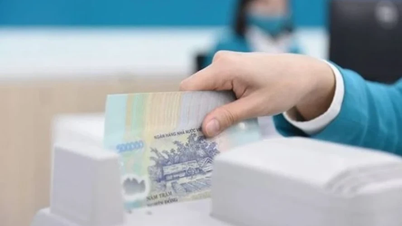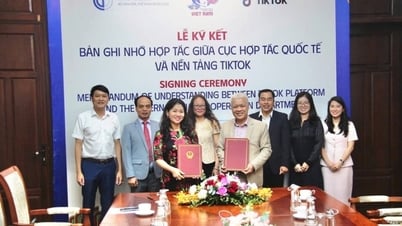
Draft law and those new points and expectations
Before the adjustments in the draft Law on Tax Administration and the Law Value added tax, domestic enterprises have faced many challenges in competing with foreign suppliers. Companies cross border These companies, which do not have a permanent establishment in Vietnam, often take advantage of loopholes in tax policies to avoid tax obligations. This not only reduces budget revenue but also creates an unfair environment for domestic enterprises.
A typical example is large online advertising platforms such as Google and Facebook. Although these platforms have huge revenues from Vietnamese businesses, if payment is made via international cards, the value-added tax is almost completely ignored. This puts domestic advertising service providers at a distinct disadvantage, because they not only have to pay taxes but also have to comply with regulations on declaring and paying value-added tax.
Speaking to Nhan Dan Newspaper reporter, Mr. Vu Bao Thang, Deputy Head of Human Resources Development Department - Vietnam E-commerce Association, CEO of Meta Ecom, this causes damage to domestic enterprises: "Domestic enterprises that want to advertise or sell via digital platforms have to bear a lot of compliance costs. Meanwhile, foreign enterprises only need to place advertisements, receive international payments without having to declare taxes, and are not subject to supervision. If the law is not amended, the management mechanism is not changed, Vietnamese enterprises will continue to be weak."
The draft Law on Tax Administration (amended) and the Law on Value Added Tax (amended) are expected to overcome current shortcomings and create a fairer competitive playing field.
One of the highlights of the draft Law on Tax Administration (amended) is the addition of detailed regulations on tax obligations of foreign organizations and individuals without permanent establishments in Vietnam but engaged in cross-border provision of goods and services. Accordingly, these entities will have to register, declare and pay taxes directly in Vietnam through the Electronic Information Portal of the Ministry of Finance. Tax Department. This will enable tax authorities to more closely monitor and control the activities of foreign suppliers, ensuring they fully comply with their tax obligations.
If a foreign supplier fails to meet its tax obligations, the tax authorities will have the right to apply indirect enforcement measures. These measures include requiring banks to withhold or pay tax on behalf of the supplier or to cooperate with the relevant authorities to handle violations. It is important to clearly and specifically stipulate these enforcement measures to ensure that foreign suppliers cannot circumvent the law.
The draft Law on Value Added Tax (amended) also adds provisions clearly defining the VAT obligations of foreign suppliers without a permanent establishment in Vietnam. Accordingly, foreign suppliers that sell goods or provide services to organizations and individuals in Vietnam will have to declare and pay VAT. If they fail to fulfill this obligation, the tax will be transferred to an intermediary organization such as an e-commerce trading floor, bank or payment organization.
“This is a very noteworthy adjustment,” said Mr. Thang. “Previously, foreign suppliers could avoid paying VAT or pay only a low rate (5% of revenue), creating a price advantage over domestic enterprises, which were subject to a higher VAT rate of 8-10%. The new law will raise the VAT rate for services of foreign suppliers to 10%, ensuring fairness between domestic and foreign enterprises.” This will help reduce the price gap between domestic and foreign enterprises, creating conditions for domestic enterprises to compete more fairly in the market.
Challenges to be addressed
Despite the positive steps taken in the draft law, experts say the biggest challenge remains enforcement. Enforcement of measures against foreign suppliers without a presence in Vietnam will be difficult. To collect taxes effectively, a centralized data system must be built, connecting information between authorities, banks, payment institutions and digital platforms.
It is impossible to expect voluntary compliance from foreign suppliers without specific sanctions. Enforcement tools through banks, payment institutions or information regulators will need to be effectively implemented.
Mr. Vu Bao Thang, Deputy Head of Human Resources Development Department - Vietnam E-commerce Association, CEO of Meta Ecom
“We cannot expect foreign suppliers to voluntarily comply without specific sanctions. Enforcement tools through banks, payment institutions or information management agencies will need to be effectively operated,” Mr. Thang emphasized. However, the problem is not only the provisions in the law but also the ability to implement these measures in practice.
Sharing with Nhan Dan Newspaper reporters, lawyer Nguyen Xuan Dung, Hanoi Bar Association, also shared: "The regulations are available, but to implement them, early and synchronous intervention of the authorities is needed. Without information on transactions and cash flows, determining tax obligations will be very difficult." Lawyer Nguyen Xuan Dung emphasized that tracking cross-border cash flows is a big challenge, as many transactions are often made through international payment platforms without the supervision of Vietnamese tax authorities. To solve this problem, authorities will need to have a mechanism for close coordination with international financial institutions, banks and e-commerce platforms to clearly determine tax responsibilities.
Vietnamese businesses, especially those in the e-commerce and online advertising sectors, expect the draft regulations to create a more level playing field between domestic and foreign businesses. By clearly defining the tax obligations of foreign suppliers, domestic businesses will no longer face unfair competition from cross-border suppliers.
Mr. Vu Bao Thang added: “Currently, domestic enterprises that want to advertise or sell via digital platforms have to bear a lot of compliance costs. Meanwhile, foreign enterprises only need to place advertisements, receive international payments without having to declare taxes and are not subject to supervision. Without this adjustment, Vietnamese enterprises will continue to be at a disadvantage." The application of new tax regulations is necessary to minimize the unfair advantage that foreign suppliers gain from tax avoidance.
However, the tax increase could also lead to higher product prices, especially for individuals or businesses that are not VAT registered, as they cannot deduct input tax. This could affect consumer purchasing power, but overall, it is a necessary step to promote a more transparent and fair market.
The provisions in the draft Law on Tax Administration and the Law on Value Added Tax (amended) are important steps to ensure fair competition between domestic and foreign enterprises. However, to achieve this goal, the authorities need to implement it resolutely and synchronously, establish databases, connect information and provide specific instructions to effectively enforce the regulations.
Source: https://baolangson.vn/bao-dam-cong-bang-thue-trong-thuong-mai-dien-tu-xuyen-bien-gioi-5044552.html


![[Photo] Panorama of the Opening Ceremony of the 43rd Nhan Dan Newspaper National Table Tennis Championship](https://vphoto.vietnam.vn/thumb/1200x675/vietnam/resource/IMAGE/2025/5/19/5e22950340b941309280448198bcf1d9)


![[Photo] General Secretary To Lam attends the conference to review 10 years of implementing Directive No. 05 of the Politburo and evaluate the results of implementing Regulation No. 09 of the Central Public Security Party Committee.](https://vphoto.vietnam.vn/thumb/1200x675/vietnam/resource/IMAGE/2025/5/19/2f44458c655a4403acd7929dbbfa5039)
![[Photo] President Luong Cuong presents the 40-year Party membership badge to Chief of the Office of the President Le Khanh Hai](https://vphoto.vietnam.vn/thumb/1200x675/vietnam/resource/IMAGE/2025/5/19/a22bc55dd7bf4a2ab7e3958d32282c15)
![[Photo] Close-up of Tang Long Bridge, Thu Duc City after repairing rutting](https://vphoto.vietnam.vn/thumb/1200x675/vietnam/resource/IMAGE/2025/5/19/086736d9d11f43198f5bd8d78df9bd41)




















![[Photo] Prime Minister Pham Minh Chinh inspects the progress of the National Exhibition and Fair Center project](https://vphoto.vietnam.vn/thumb/1200x675/vietnam/resource/IMAGE/2025/5/19/35189ac8807140d897ad2b7d2583fbae)






























































![[VIDEO] - Enhancing the value of Quang Nam OCOP products through trade connections](https://vphoto.vietnam.vn/thumb/402x226/vietnam/resource/IMAGE/2025/5/17/5be5b5fff1f14914986fad159097a677)





Comment (0)